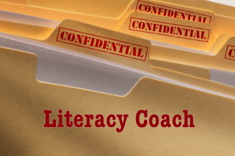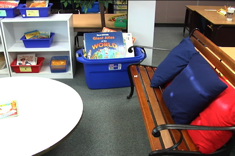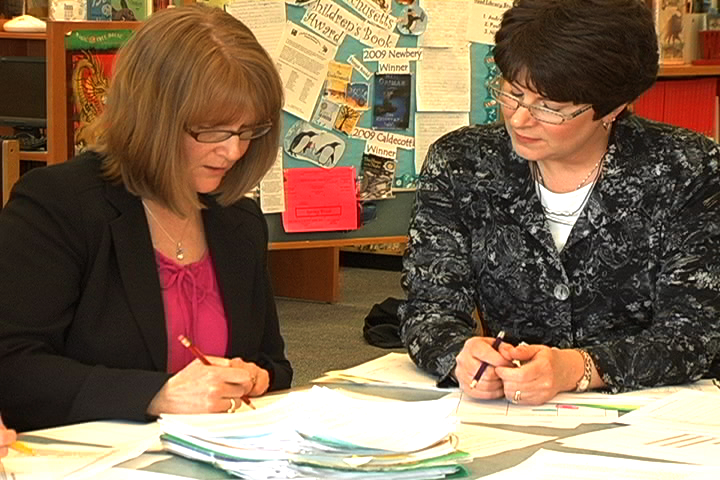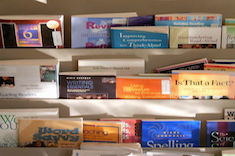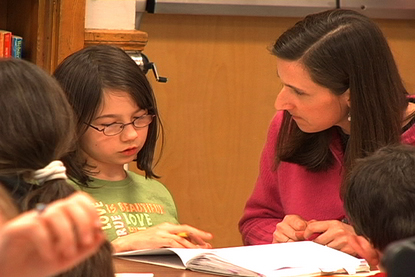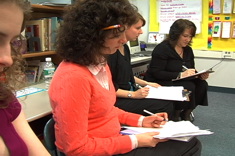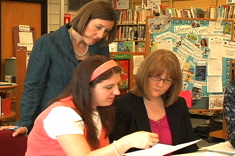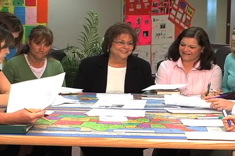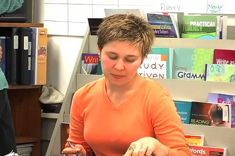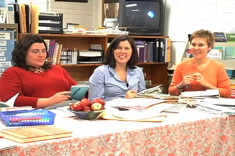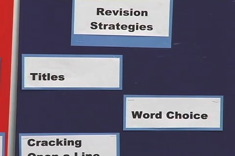Literacy Coaches
A simple question - who will coach the coaches? If you're a literacy coach, you already know there is no job more amazing or overwhelming in a school. Our Choice Literacy library includes a small sample of our resources for literacy coaches. If you work as a coach, you'll want a subscription that includes access to our Leaders Lounge, where there are over 900 resources for coaches, including study group protocols, videos of demonstration lessons, and guides for designing coaching cycles.
Latest Content
Troubleshooting Coaching Cycles
Shari Frost finds "coaching cycles" are a valuable way for literacy coaches to work with teachers over time, but the first year of implementation was bumpy for her coaches. She shares some of the struggles her colleagues encountered in implementing cycles, as well as advice for overcoming these hurdles.
Back to the Classroom
Shari Frost reflects on what went wrong (or right) when a literacy coach decides to return to the classroom, and in doing so considers the kind of support literacy coaches need to thrive.
Reflecting on Student Work in Staff Meetings (TEMPLATE)
Jennifer Allen describes a protocol for analyzing student work in teacher study groups and staff meetings, and includes a template for discussing classroom artifacts.
Starting the School Year: A Checklist for Literacy Coaches
With all the checklists for launching the school year available for teachers, isn't it about time someone developed one for literacy coaches? Jan Miller Burkins has done just that – her Launching the Year Checklist is concise, and tackles everything from reformatting computer files to touching base with each teacher.
From Congeniality to Collegiality: Protocols for Meetings and Observations
Clare Landrigan and Tammy Mulligan suggest a few tested and successful protocols for meetings and study groups that foster more thoughtful conversations.
Opening Classroom Doors
Clare Landrigan and Tammy Mulligan share many nonthreatening techniques to break down resistance among teachers to classroom visits and collaboration.
Structuring Coaching Conferences
Get the most of your one-on-one coaching conferences with these suggestions from Clare Landrigan and Tammy Mulligan.
Building a Professional Library from Scratch
There are so many new professional books available for literacy leaders to purchase…and so little funding to buy them. Shari Frost gives the details of how one coach surveyed colleagues, assessed needs, and rooted out bargains before spending the precious $500 allocated for stocking the professional book library.
Eight Tips for Building Relationships: A Tale of Two Literacy Coaches
Shari Frost presents a tale of two literacy coaches – one who has had success building close relationships with colleagues, and one who has struggled. In analyzing their experiences, she presents eight practical strategies for building relationships over time.
Sales Clerks and Literacy Leaders
Franki Sibberson reflects on what makes a perfect salesperson . . .and literacy coach.
Creating Structures to Sustain Our Work
Jennifer Allen explains how she enlisted teachers to lead a day-long inservice.
I Believe . . . Some Thoughts on Marathons and Sustained Professional Development in Schools
Jennifer Allen runs her first marathon, and finds the good, bad, ugly, and ultimately inspiring experience is a great metaphor for professional development design that endures.
Cartwheels, Backward Rolls, and Literacy Coaching
Jennifer Allen observes the scaffolds her daughter's gymnastics teacher uses and gradually abandons over time. These observations make her think about how she is gradually releasing new teachers from different kinds of support as they enter their second, third, and fourth years of teaching.
Making the Rounds: Visiting Everyone
Jan Miller Burkins finds getting into a classroom isn't that different from getting into a party. It's your choice whether you crash your way in or get a legitimate invitation – and how you get in certainly affects how you're perceived once you're there.
Notetaking Strategies Part I: “In the Midst” and “After the Fact” Notes
There is a difference between “in the midst” and “after the fact” notes, and different methods might work better in different observation contexts once you know your options.
On Board with Literacy Leadership
Wisconsin literacy coaches Jennifer Jones and Charity Meyer were inspired by Jennifer Allen’s “Literacy Room” to try out “Literacy News” resource boards in their schools. They provide helpful tips for starting these boards in your school, as a way to give continuous and timely support to teachers at any level.
Notetaking Series Part III: “Raw” and “Cooked” Notes
In "Raw and Cooked Notes," the value of uncensored notes is presented, as well as a simple strategy for beginning to code and analyze the observations you are jotting down.
The Power of Layered Coaching
Jennifer Allen presents her coaching model for varied and rich support of teachers.
Literacy Chats with Teachers: Routines and Guidelines
Principal Karen Szymusiak explains the format and goals of literacy chats at her school, and provides a video example of a grades 3-5 chat.
Learning from the Shadows
Jennifer Allen writes about the power of being shadowed by a young teacher, Jeni, for a full day.
Staying Focused in Literacy Workshops
Clare Landrigan meets with a group of fifth graders to talk about what’s going well in literacy workshops, and to set individual goals.
“Hard” Reading Workshop: Understanding How Proficient Readers Comprehend Difficult Text
The Hard Reading Workshop is a terrific professional development activity for launching conversations about text difficulty and strategy instruction.
January New Teacher Group Update: When Life Happens
Preparing for a forced sick day with her daughter, Jennifer Allen is reminded that the culture of professional development in her school is something she can depend on.
New Teacher Conversations: Breaking Through Roadblocks and Sustaining Support
The roadblocks activity can easily be adapted for study groups looking at almost any topic.
Watching Teachers Teach: An Observation Form for Literacy Coaches
Being genuine about feedback is essential to educators. Jan Miller Burkins finds a form and process that allows her to be both thoughtful and specific.
Looking Back to Move Forward: The Plan Book Scavenger Hunt for Literacy Leaders
Jennifer Jones is as busy as the rest of us at the end of the school year. Yet she finds time spent in a “scavenger hunt” of her planning book/calendar is essential for setting realistic goals and scheduling professional development priorities for next year.
New Teacher Conversations: Management Stories from the Classroom
Ruth Shagoury provides a workshop model for teacher leaders looking to encourage respectful conversation with new teachers on the topics that are near and dear to them.
Letting Go and Holding On: Evaluating Our Work as Literacy Coaches
It’s hard to know where we’re going if we don’t know where we’ve come from. Jan Miller Burkins has developed an evaluation form for literacy coaches to give to teachers.
The Language of Coaching Part I: Word Choices
If you believe it’s challenging but “possible to be tactful without being inauthentic,” Jan Miller Burkins will guide you around the thorniness of the language of coaching.
Literacy Coaching Interview Rubric
This rubric can help anyone interviewing for a literacy coaching position determine if there is a philosophical fit between their beliefs and the goals of the school. The rubric is also helpful for any school in the process of defining responsibilities for literacy coaches
Browse Content By
Type
Category
- Assessment Tools
- Big Fresh Archives
- Booklists
- Choice Numeracy
- Classroom Design
- Common Core
- Community Building
- Conferring
- Content Literacy
- Digital Literacy
- English Language Learners
- Equity
- Family Relations
- Free Samples
- Guiding Groups
- Leadership
- Literacy Coaches
- Mentor Texts
- Minilessons
- New Teacher Mentors
- Podcasts
- Poetry
- Quote Collections
- Reading Strategies
- Self Care
- Struggling and Striving Learners
- Talking and Listening
- Teacher Study Groups
- Teaching Reading
- Teaching Writing
- Word Study and Vocabulary
Author
- Melissa Quimby
- Nawal Qarooni
- Gwen Blumberg
- Julie Cox
- The Lead Learners
- Hannah Tills
- Josie Stewart
- Ruth Metcalfe
- Mallory Messenger
- Becca Burk
- Jodie Bailey
- Vivian Chen
- Mary Brower
- Tiffany Abbott Fuller
- Stephanie Affinito
- Ruth Ayres
- Leigh Anne Eck
- Heather Fisher
- Shari Frost
- Julie Johnson
- Suzy Kaback
- Gigi McAllister
- Shirl McPhillips
- Melanie Meehan
- Cathy Mere
- Debbie Miller
- Tara Barnett and Kate Mills
- Tammy Mulligan
- Dana Murphy
- Bitsy Parks
- David Pittman
- Brenda Power
- Heather Rader
- Matt Renwick
- Mandy Robek
- Christy Rush-Levine
- Gretchen Schroeder
- Jen Schwanke
- Brian Sepe
- Katherine Sokolowski
- Stella Villalba
- Jennifer Vincent
Grade Level
Choice Literacy Membership
Articles
Get full access to all Choice Literacy article content
Videos
Get full access to all Choice Literacy video content
Courses
Access Choice Literacy course curriculum and training

